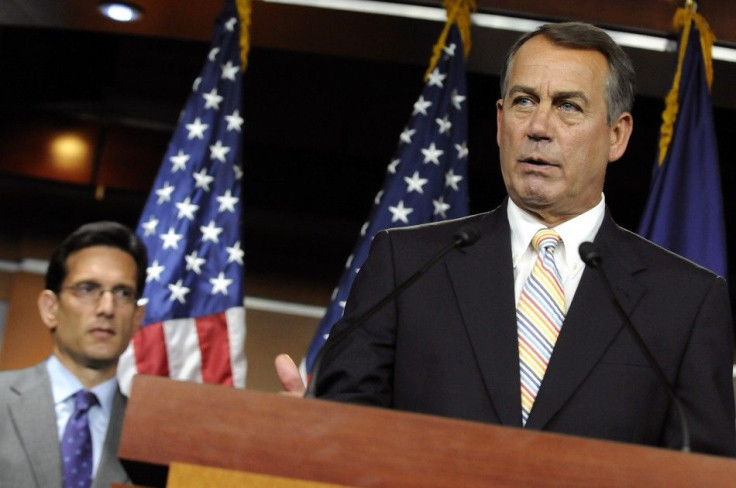'Gang of Six' Debt Plan Could Hinge on Tea Party Support

ANALYSIS
The 'Gang of Six' debt plan, and President Obama's approval of its outline, has created momentum in Washington for a landmark deficit-reduction package that would also avert a U.S. Government default. But two words could sap that momentum in a hurry: Tea Party.
Focus now shifts to the Republican-controlled U.S. House, where Speaker John Boehner, R-Ohio, could very well have his hands full trying to maintain GOP support for the debt plan.
That's because Boehner, an old-school politician, is being pressured by upstart House Majority Leader Eric Cantor, R-Va., a leader of the Tea Party coalition.
So far, Cantor has not shown substantive signs that he's willing to retreat from Tea Party ideology and strike a common ground deal with the Obama administration -- and with fellow Republicans -- that would entail shared sacrifice.
Most recently, Cantor's rhetoric during a White House meeting with Obama and Congressional Leadership disappointed if not irritated Obama, who allegedly said, Eric, don't call my bluff on this one, The New York Times reported.
Cantor Faces Unenviable Dilemma
Even so, Cantor's deilemma should not be overlooked. He's the de-facto leader of the Tea Party faction, whose members gave iron-clad pledges to not raise the debt ceilng during their term. In fact, many Tea Party members campaigned on that pledge.
In Washington-speak, whenever an elected official gives an iron-clad pledge, it's called, painting yourself into a corner, i.e. it frequently leaves little option for an issue stance change that voters will not remember. Hence Cantor's dilemma: how to convince Tea members that this is both a debt deal worth agreeing to, and one that won't hurt them with their conservative, limited-government base.
And, to be sure, some Tea Party voters will not be happy with the Gang of Six plan.
The Gang of Six senators have decided to band together once more, saying Tuesday that the bipartisan group has reached an agreement to trim more than $4 trillion off the deficit over the coming decade.
The proposal by the Gang of Six senators reduces discretionary spending and address health-care spending and entitlements, in addition to raising revenue, The Washington Post reported.
The group of more than 40 Republicans and Democrats -- rejoined by Oklahoma Sen. Tom Coburn, who returned after winning concessions on more cuts to costly federal health care programs -- came up with a plan President Barack Obama called broadly consistent with the White House's approach to raising the debt limit. He described it as a very significant step.
We're in the same playing field, Obama said Tuesday from the White House.
After failing to reach an accord -- and apparently disbanding last week -- the group says it's nearing an agreement on a proposal, which could offer an alternate strategy for pushing an increase in the debt limit through Congress before the Aug. 2 deadline.
We've gone from a Gang of Six to a mob of 50, said Sen. Joe Manchin, D-W.Va., as he emerged from the meeting. The proposal, he said, shows great promise.
I will support it. It is a fair compromise, added Sen. Kay Bailey Hutchison, R-Texas. This is a way forward where we can do the work that we have come here to do.
According to a copy of a summary of the Gang of Six plan, it would impose $500 billion in deficit cuts, cut security and non-security spending over 10 years with spending caps, make the Medicare and Medicaid healthcare programs operate more efficiently and abolish the Alternative Minimum Tax.
The tax reform outline would set up three income tax rates: a bottom rate of 8-12 percent; a middle rate of 14-22 percent and a top rate of 23-29 percent to replace the current system that has a bottom rate of 10 percent, with five additional rates topping out at 35 percent, The Associated Press reported. It would also reduce, but not eliminate, tax breaks on mortgage interest, higher-cost health plans, charitable deductions, retirement saving and tax credits for families and children.
The development arrives as lawmakers and the Obama administration continue to spar over the creation of a debt-reduction that a hostile Congress would agree to, allowing the rise of the legal limit on government borrowing -- the debt ceiling. If Congress consents to a plan to raise the $14.3 trillion debt limit by Aug. 2, a government default will be averted.
Political/Public Policy Analysis: Not to overlook the Senate, where the Gang of Six plan also will face substantive review and a legislative tweek or two, the real battle is in the House.
It is an open question as to whether Boehner can hold together one of the most conservative House GOP coalitions in generations. He's going to need Cantor's help. If Cantor protests, the plan will likely be jeopardy. On that uncertainty, the risk barometer, on a scale of 0 to 100 percent, of the likelihood of a U.S. Government default, remains at 25 percent Wednesday morning, the same level as Tuesday afternoon.
.
© Copyright IBTimes 2025. All rights reserved.





















